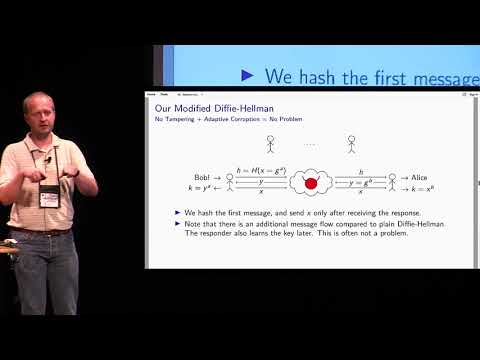CryptoDB
Practical and Tightly-Secure Digital Signatures and Authenticated Key Exchange
| Authors: | |
|---|---|
| Download: |
|
| Presentation: | Slides |
| Conference: | CRYPTO 2018 |
| Abstract: | Tight security is increasingly gaining importance in real-world cryptography, as it allows to choose cryptographic parameters in a way that is supported by a security proof, without the need to sacrifice efficiency by compensating the security loss of a reduction with larger parameters. However, for many important cryptographic primitives, including digital signatures and authenticated key exchange (AKE), we are still lacking constructions that are suitable for real-world deployment.We construct the first truly practical signature scheme with tight security in a real-world multi-user setting with adaptive corruptions. The scheme is based on a new way of applying the Fiat-Shamir approach to construct tightly-secure signatures from certain identification schemes.Then we use this scheme as a building block to construct the first practical AKE protocol with tight security. It allows the establishment of a key within 1 RTT in a practical client-server setting, provides forward security, is simple and easy to implement, and thus very suitable for practical deployment. It is essentially the “signed Diffie-Hellman” protocol, but with an additional message, which is crucial to achieve tight security. This additional message is used to overcome a technical difficulty in constructing tightly-secure AKE protocols.For a theoretically-sound choice of parameters and a moderate number of users and sessions, our protocol has comparable computational efficiency to the simple signed Diffie-Hellman protocol with EC-DSA, while for large-scale settings our protocol has even better computational performance, at moderately increased communication complexity. |
Video from CRYPTO 2018
BibTeX
@inproceedings{crypto-2018-28835,
title={Practical and Tightly-Secure Digital Signatures and Authenticated Key Exchange},
booktitle={Advances in Cryptology – CRYPTO 2018},
series={Lecture Notes in Computer Science},
publisher={Springer},
volume={10992},
pages={95-125},
doi={10.1007/978-3-319-96881-0_4},
author={Kristian Gjøsteen and Tibor Jager},
year=2018
}

